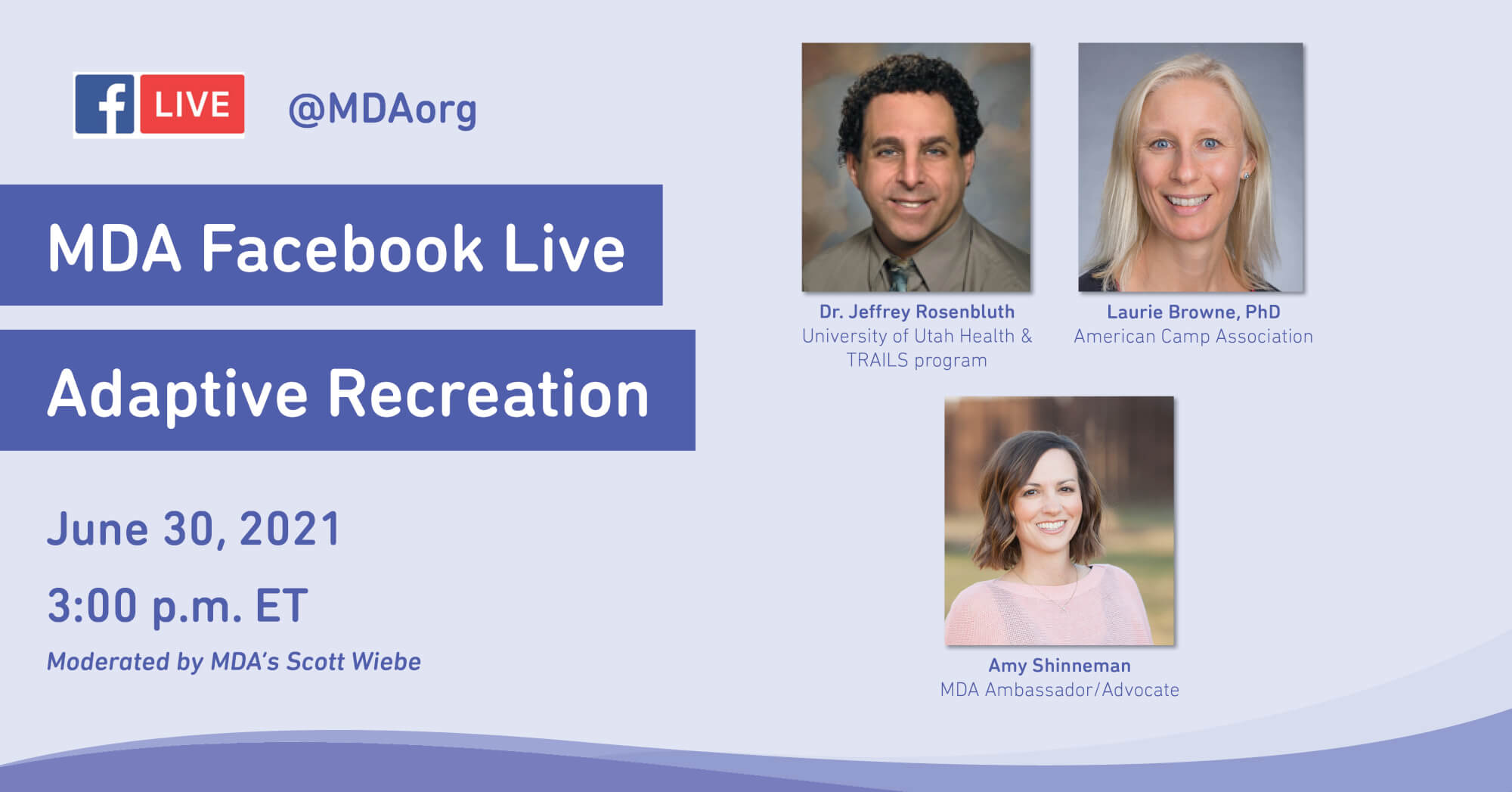About Us
Our mission is to empower people living with neuromuscular diseases to live longer, more independent lives.
Muscular Dystrophy Association Hosts Facebook Live @MDAorg on Adaptive Recreation
New York, NY, June 14, 2021 –
What/Where/When: The Muscular Dystrophy Association (MDA) invites you to join a special virtual @MDAorg Facebook Live conversation on adaptive recreation for individuals and their caregivers in the neuromuscular disease community on Wednesday, June 30 at 3pm ET.

Who: Featuring Dr. Jeffrey Rosenbluth, University of Utah Health Science Center & TRAILS program, Laurie Browne, Ph.D, American Camp Association, and Amy Shinneman, MDA Ambassador/Advocate, moderated by MDA’s Scott Wiebe.
Topics to be covered:
- What is adaptive recreation and why is it important?
- Common adaptations in recreation for the neuromuscular community
- Science behind the benefit of camp and recreation
- MDA’s virtual summer camp program
- Tips for incorporating recreation into daily life
Why:
According to the Outdoor Foundation, more than half of the United States population participates in at least one outdoor activity (over 151 million Americans). That leaves 50% of the population who does not participate in outdoor activities. Outdoor activities have been proven to decrease stress, increase self-esteem and provide overall physical and health benefits to individuals. There are many options for recreation opportunities for individuals living with neuromuscular diseases. This Facebook Live event will share information on the benefits of incorporating recreation into your daily life, in addition to specific details on adaptive recreation opportunities.
Bios:
Dr. Jeffrey Rosenbluth has promoted a vision of health, independence, and an active lifestyle for individuals with complex physical disabilities in the Intermountain west since 2001. In 2003 he developed the University of Utah’s TRAILS (Technology, Recreation, Access, Independence, Lifestyle, Sports) Program with a goal of maximizing quality of life through innovations in wellness, sports, recreation, education, and advocacy. TRAILS provides 15,000 community program hours and Rosenbluth believes strongly in incorporating University of Utah students from diverse backgrounds into all aspects of program development and support. His work on TRAILS has attracted widespread support from leading funding organizations in the field, including the Craig H. Neilsen Foundation, the United States Olympic Committee, and the United States Veterans Administration. Over the last 15 years, Rosenbluth has obtained more than five million dollars in support for innovative product and program development for individuals with complex disabilities. In 2013, Rosenbluth received the Craig H. Neilsen Presidential Endowed Chair of Spinal Cord Injury Medicine.
Dr. Laurie Browne is the Director of Research for the American Camp Association. In that role, she works to expand the value, visibility, and accessibility of camp experiences through rigorous research and supporting camps in their continuous quality improvement efforts. Her background includes many years of attending camp, working at camp, directing camp, and now sending her own children to camp each summer.
Amy Shinneman is the MDA State Ambassador in Indiana, an advocate, and a recreation participant for MDA’s Team Momentum. With the support of her husband, Jamie Shinneman, they have run marathons and raised awareness, to fund research and care for the neuromuscular community while raising two teenaged boys. Shinneman lives with Bethlem myopathy, a type of congenital muscular dystrophy that causes muscle weakness throughout her limbs. To stay active, she does pool workouts several times a week and posts about her journey with neuromuscular disease on her social media including Facebook, Twitter, Instagram, and blog entitled Humbly Courageous. Shinneman is also a volunteer counselor at virtual MDA Summer Camp this season.
Scott Wiebe, MDA Community Relations Manager, is a long-time MDA supporter and staff member who began engaging with the MDA Community as a Summer Camp volunteer for several years before joining the organization full time. Wiebe has been an MDA team member for 15 years, working with a variety of programs over his career, including pivoting to virtual Summer Camp programming when in-person camp was cancelled due to the pandemic. In addition, Wiebe helped families stay connected throughout the pandemic with a newly launched MDA’s Let’s Play gaming program, and he oversees the prestigious MDA National Ambassador program, helping our families share their stories to amplify the mission of the organization to fund research, care and advocacy for the neuromuscular community.
About the Muscular Dystrophy Association
For 70 years, the Muscular Dystrophy Association (MDA) has been committed to transforming the lives of people living with muscular dystrophy, ALS, and related neuromuscular diseases. We do this through innovations in science and innovations in care. As the largest source of funding for neuromuscular disease research outside of the federal government, MDA has committed more than $1 billion since our inception to accelerate the discovery of therapies and cures. Research we have supported is directly linked to life-changing therapies across multiple neuromuscular diseases. MDA's MOVR is the first and only data hub that aggregates clinical, genetic, and patient-reported data for multiple neuromuscular diseases to improve health outcomes and accelerate drug development. MDA supports the largest network of multidisciplinary clinics providing best-in-class care at more than 150 of the nation's top medical institutions. Our Resource Center serves the community with one-on-one specialized support, and we offer educational conferences, events, and materials for families and healthcare providers. MDA Advocacy supports equal access for our community, and each year thousands of children and young adults learn vital life skills and gain independence at summer camp and through recreational programs, at no cost to families. During the COVID-19 pandemic, MDA continues to produce virtual events and programming to support our community when in-person events and activities are not possible. MDA’s COVID-19 guidelines and virtual events are posted at mda.org/COVID19. For more information, visit mda.org.